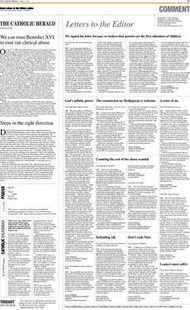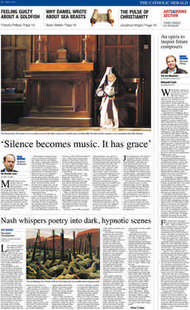Page 17, 9th April 2010
Page 17

Report an error
Noticed an error on this page?If you've noticed an error in this article please click here to report it.
Tags
Share
Related articles
THE WORD THIS WEEK
By Bishop David McGough
Second Sunday of Easter Acts 5:12-16; Rev 9:11-13 & 17-19; Jn 20:19-21 The Gospels describe the life, death and resurrection of Jesus. The Acts of the Apostles continues the narrative of the resurrection in a people, a Church raised up and alive in Our Lord Jesus Christ. The Risen Lord, who dwelt among his disciples as they assembled in prayer at the Portico of Solomon, is present when we are assembled in his Name.
Like those who brought the sick and possessed to the apostles, we bear our own burdens into the presence of the Lord. Long ago the inhabitants surrounding Jerusalem struggled with Roman occupation, poverty and the inequalities of the ancient world. Today, we struggle with the excesses and inequalities of a modern society, a world that is increasingly defensive and self-centred, a Church that is struggling for credibility in the eyes of many. The crisis that confronts faith today is no less real than that brought upon the disciples at the death of Jesus.
Our response must share in the confidence of the vision granted to John on the island of Patmos. To modern understanding the Book of Revelation is probably the most obscure of the New Testament books. Its fundamental purpose, however, is unmistakable and shines through the Book.
“Do not be afraid; it is I, the First and the Last; I am the Living One. I was dead now I am to live for ever and ever, and I hold the key of death and the underworld.” This joyful proclamation for the Risen Lord, voiced from a persecution that threatened extinction, calls us to a humility that confesses that alone we cannot manage our own lives, cannot manage a sinful world. Only in the Risen Lord, in him who is First and Last, is the Church alive.
St John’s resurrection narrative addresses the fears and hopes that have accompanied faith in every generation.
“In the evening of that same day the doors were closed in the room where the disciples were for fear of the Jews. Jesus came and stood among them. He said to them: ‘Peace be with you’ and showed them his hands and side.” We who are tempted to hide behind the closed doors of uncertainty and guilt must have the humility to acknowledge the presence of our Risen Lord. More than this, in true poverty of faith, we must learn to surrender our hopes to him. Only in such faith shall we discover the peace that heals, the renewed sense of mission that comes only from the Lord: “As the Father has sent me, so am I sending you. After saying this he breathed on them and said: ‘Receive the Holy Spirit.’” As individuals, and as a Church, we must learn over and over again that the message we proclaim is not our own. Our mission came from the Father and was entrusted to the Son. It is from the Son, and in the strength of his Spirit, that we have received our mission to the world. It is, above all, a ministry of healing and peace. “For those whose sins you forgive, they are forgiven.” We, like those first disciples, must have the humility to seek and receive forgiveness before we can bring healing to the world.
Like Thomas, we are likely to feel that our faith is not sufficient to sustain the Word entrusted to us. Let us bring a struggling faith to the Lord’s blessing: “Happy are those who have not seen and yet believe.”
blog comments powered by Disqus





















